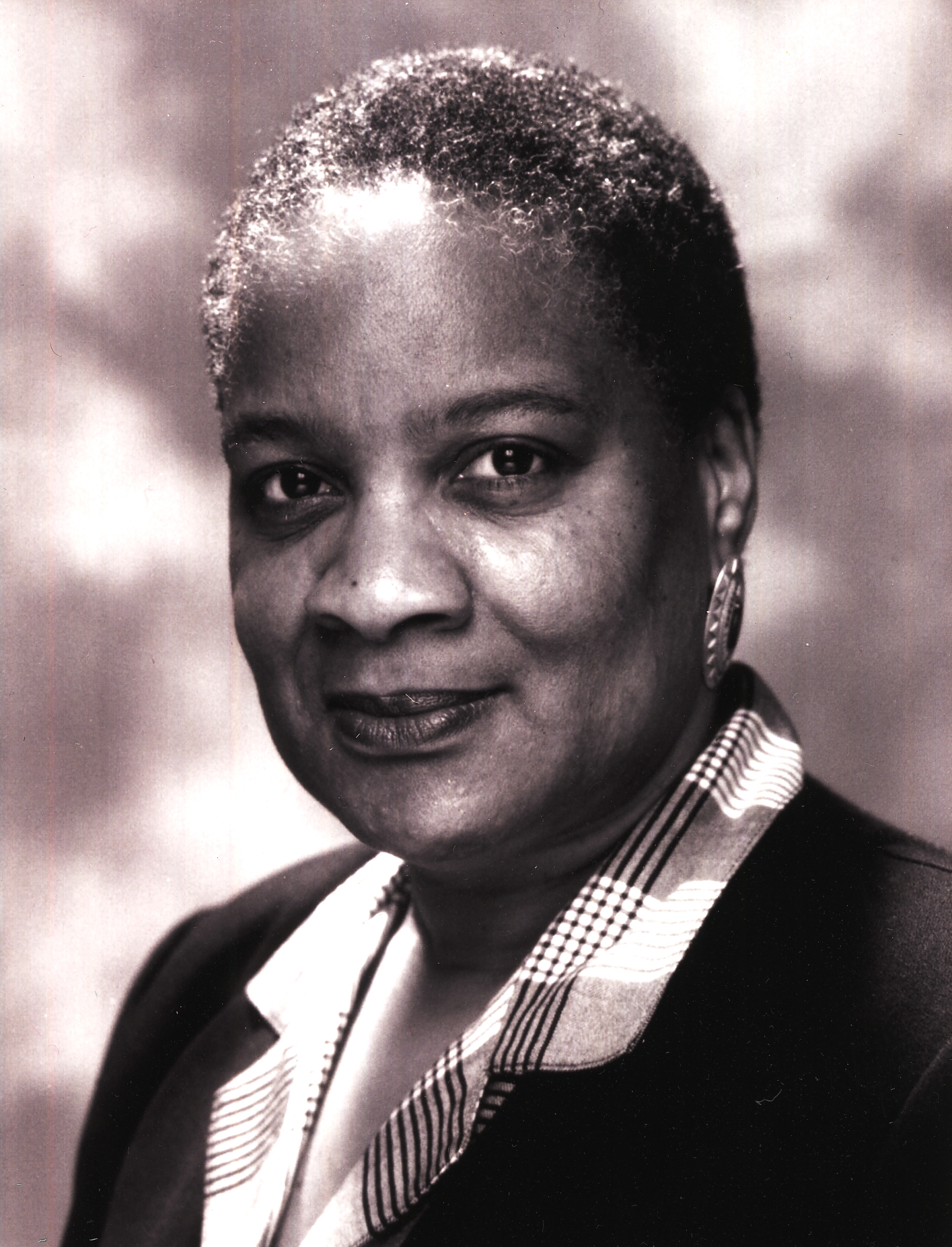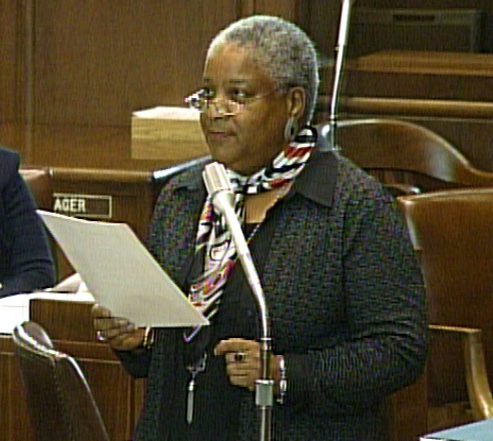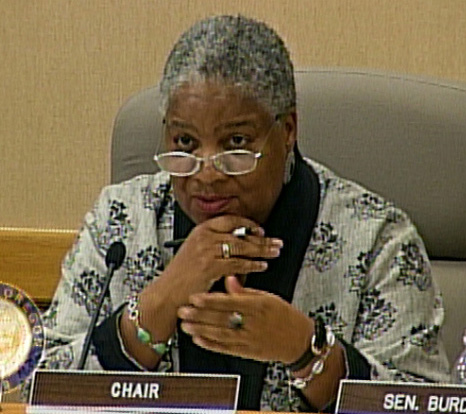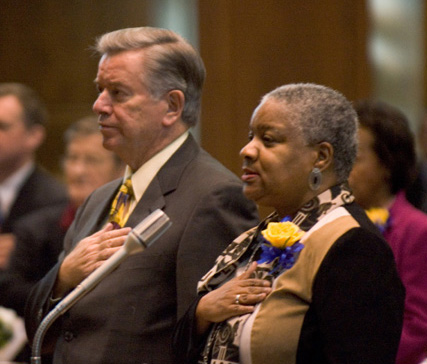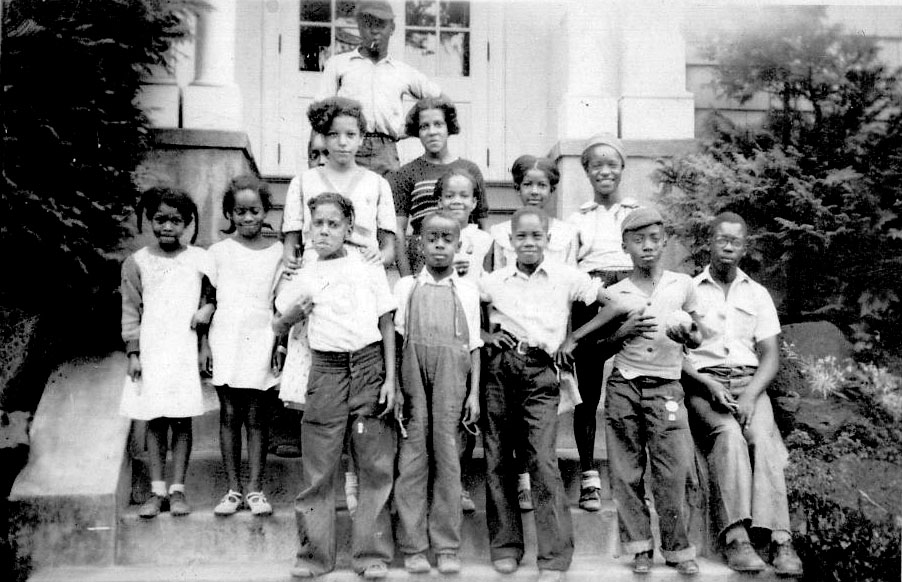In 1996, Avel Louise Gordly became the first African American woman to be elected to the Oregon State Senate. Gordly was born in Portland on February 13, 1947. Her father, Fay Gordly, was a railroad worker active with the Brotherhood of Sleeping Car Porters and Maids; her mother, Beatrice Bernice Coleman Gordly, was a long-time member of Mt. Olivet Baptist church and a Grand Worthy Matron of the Eastern Star.
Gordly graduated from Girls Polytechnic High School in 1965 and worked at Pacific Northwest Bell until 1970. That year, she enrolled at Portland State University, where she earned a degree in the administration of justice. After graduation, she worked for the Oregon Corrections Division as a women’s work-release counselor and later as an adult parole and probation officer.
A key affiliation for Gordly was the Black United Front (BUF). A national civil rights group headquartered in Chicago, Portland’s dynamic BUF was founded in 1979 by a core group of activists, including Ronald Herndon and the Reverend John Jackson. In addition to handling media work for the group, Gordly coordinated the Front’s Saturday School, whose African American history program was tied to curriculum reform in the public education system. With the Front’s spin-off, Portlanders Organized for Southern African Freedom, and in concert with the American Friends Service Committee (AFSC), Gordly helped score key anti-apartheid victories in Oregon during the 1980s, including the resignation of the South African consul from his Portland office and divestiture legislation in Salem.
In 1979, Gordly joined the Urban League of Portland as head of its Youth Service Center. In 1983, AFSC hired her to lead their Southern Africa Program, which was focused on anti-apartheid and refugee relief, and Gordly made national headlines when she was promoted to regional director of AFSC. Gordly was resident coordinator of a safe-haven program for youth at the House of Umoja in northeast Portland when she was tapped to fill a vacancy created by a retirement in the legislature in 1991. The call came from the community, first from political activist Thalia Zepatos and also the local Black Leadership Conference (BLC). Zepatos and BLC's call was echoed and supported by other activists, local leaders, friends, and allies who were all eager for Gordly to serve.
Gordly was subsequently elected state representative from north and northeast Portland in 1992, and she served until retiring in 2009. Her legislative record includes an array of initiatives that focus on cultural competency in education, mental health, and the administration of justice. In addition to committee assignments such as Joint Ways and Means, Education Policy, Trade and Economic Development, and Environmental Quality, Gordly advocated for and then co-chaired Governor John Kitzhaber’s Task Force on Racial and Ethnic Health in addition to serving on the Public Commission on the Oregon Legislature. Another innovation to her credit was the Governor’s Task Force on Environmental Justice, now enshrined in law and a nationally recognized initiative still serving Oregonians. She also achieved notable reform in the Senate caucus system and briefly secured press access for meetings that were usually closed. Over many years, she has traveled in seventeen African nations, including South Africa and Zambia in 1997 as part of an Oregon trade delegation.
Gordly has received awards from groups such as the YWCA of Greater Portland, the NAACP, the Oregon Youth Authority, Delta Sigma Theta Sorority, the Girl Scouts, and the Oregon Commission for Women. In 2008, Oregon Health Sciences University opened the Avel Gordly Center for Healing, dedicated to culturally specific mental health and psychiatric services. In 2009, Albina Head Start recognized Gordly’s championing of funding for their programs state-wide by renaming its administrative headquarters in her honor. Oregon State University Press published her memoir, Remembering the Power of Words: The Life of An Oregon Legislator, Activist, and Community Leader in 2011. Recently, she received the Urban League of Portland’s Edwin C. Berry Lifetime Achievement Award, the Legislative Leadership Lifetime Achievement Award from the National Newspaper Publisher’s Association, the Skanner News, and the Portland Observer, and the J.C. Hawthorne League’s Oregon Mental Health Caucus Founder’s award.
-
![Avel Gordly.]()
Gordly, Avel.
Avel Gordly. Photo Richard Brown
-
![Senator Gordly on the Senate floor filing a vote explanation on SB 400, March 21, 2007.]()
Gordly, Avel, Mar 21 2007.
Senator Gordly on the Senate floor filing a vote explanation on SB 400, March 21, 2007. Courtesy Oreg. Senate Majority Ofc.
-
![Senator Avel Gordly, Jan. 2005.]()
Gordly, Avel, w&m-judic, Jan 24 2005.
Senator Avel Gordly, Jan. 2005. Courtesy Oreg. Senate Majority Ofc.
-
![Senator Avel Gordly (r) with Portland Mayor Tom Potter at opening day of 2005 legislative session.]()
Gordly, Avel, with Potter, Tom, Feb 7 2005.
Senator Avel Gordly (r) with Portland Mayor Tom Potter at opening day of 2005 legislative session. Courtesy Oreg. Senate Majority Ofc.
Related Entries
-
![Black People in Oregon]()
Black People in Oregon
Periodically, newspaper or magazine articles appear proclaiming amazeme…
-
![Gladys McCoy (1928–1993)]()
Gladys McCoy (1928–1993)
Gladys Sims McCoy was one of the first person of color elected to publi…
-
![Margaret Louise Carter (1935–)]()
Margaret Louise Carter (1935–)
Margaret Carter was the first Black woman to be elected to the Oregon S…
Related Historical Records
Map This on the Oregon History WayFinder
The Oregon History Wayfinder is an interactive map that identifies significant places, people, and events in Oregon history.
Further Reading
Gordly, Avel, with Patricia A. Schechter. Remembering the Power of Words: The Life of an Oregon Activist, Legislator, and Community Leader. Corvallis: Oregon State University Press, 2011.
McLagan, Elizabeth. A Peculiar Paradise: Blacks in Oregon, 1788-1940. Portland, Ore.: Georgian Press, 1980.
Taylor, Quintard, and Shirley Ann Wilson Moore, eds. African American Women Confront the West: 1600-2000. Norman: University of Oklahoma Press, 2003.

